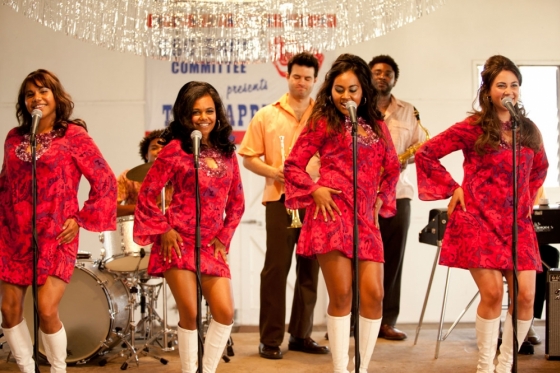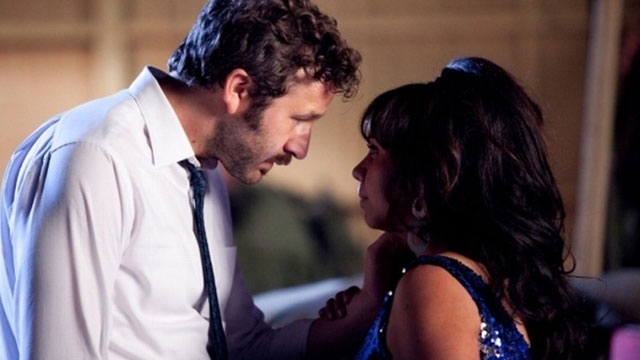|
The
Sapphires
Reviewed by
Damien Straker on
August 12, 2012
Hopscotch presents
a film directed by
Wayne
Blair
Screenplay
by
Deborah
Mailman, Jessica Mauboy, Shari
Sebbens, Miranda Tapsell and Chris O'Dowd
Running
Time:
103 mins
Rating:
PG
Released:
August 9th,
2012
|
7/10
|
|
In the late 1960s, three Aboriginal sisters have
grown up together on a mission in rural Australia. Two of the girls
are Gail
(Deborah Mailman) and Cynthia (Miranda Tapsell), and they look to
attend a
singing contest in town, while leaving their sister Julie (Jessica
Mauboy) behind
because she is too young. Despite the immediacy of racism against
Aboriginal
people in the town, the girls enter the contest and are met by Julie
who
manages to sneak away from their home. The girls are clearly talented
and their
gift for singing is recognised by Dave (Chris O'Dowd), a drunk who has
a gig in
the pub. He wants to manage the girls because he genuinely likes their
voices
but he encourages them to embrace soul music instead of country and
western.
Given Julie's age, Gail tries to find a replacement for her through
their
cousin Kay (Shari Sebbens), a child of the Stolen Generation, who grew
up with
white people. However, once the girls put aside all their differences
they form
their group 'The Sapphires' and Dave tells them about their biggest
gig:
travelling to Vietnam, during the war, so that they can entertain the
troops.

The
Sapphires is determined
to be liked. It has a great sense of humour, bright, luminous visuals
and entertaining
songs. It is a pleasant film but it left me asking, where is the grit?
With
each year, the Hollywood blockbusters eclipse the local Australian
films in
such a way that it is impossible to compete with the superior marketing
campaigns and this industries most lethal weapon: hype. As the local
film
industry here seeks to remain competitive, there will be an increasing
divergence between filmmakers competing for funding for grittier art
house projects
and accessible, crowd-pleasers that are more financially viable but
less
emotionally challenging. Selina Kyle was right after all: there's a
storm
coming. As delightful as it is, The
Sapphires foreshadow this movement. Its sense of humour and
likeability
comes at the expense of the idiosyncratic trait that Australian films
have of
balancing funny moments with unflinching moments of pain and anguish.
Traditionally,
local films here have an uncompromised freedom of expression because
they liberated
from the grip of a studio system, which see filmmakers reach harder and
deeper
at expressing life's wounds. However,
intending to have international success, as much as local interest,
sees that
level of autonomy quickly dissolve in the name of accessibility. The
director
of The Sapphires was Wayne Blair, who
starred in the 2005 stage play, written by Tony Briggs, who was
retelling his
own family's story. Pairing as a writer-director partnership, they
offer strong
knowledge about the source material. But they also opted to be
supported
internationally with the financial backing of Bob and Harvey Weinstein,
who are
two of the most powerful and influential producers in Hollywood.
They're billed
as executive producers on the film and snapped up the international
rights
following its positive reception in Cannes. Arguably, if it had been a
tougher and
less accessible film it would have been harder to sell globally. That
is the
price that is paid for global recognition and a dilemma that continues
to haunt
local filmmakers who are seeking to have their work recognised abroad.

The film itself is charming and funny but offers
few surprises. Lessons about culture, self-understanding and romance
are learnt
and fame is an elusive dream of a better life. The deepest the film
becomes is
when it touches on the Stolen Generation, though the scarcity of this
theme
reduces it to a broader and universal idea of learning to love who you
really
are. There are also some awkward structural lapses in the story's
timeline too.
The girls have one audition before being sent overseas and Dave's
verbal
commitment to the girls seems premature in the context of the story. I
found
that once the girls reached Saigon, the war zone felt too muted and
insulated.
The girls sing to the wounded and there is an attack scene that feels
oddly
detached from the rest of the movie. I would have liked a more palpable
sense
of danger and a more overarching look at some of the atrocities that
would no
doubt have affected the girls. The music should come as a form of
relief from
the conflict, but it should never overshadow the terrible acts of
indecency
from both sides of the war. I couldn't help but think of Suzie Q scene
from Apocalypse Now (1979), where playboy bunnies
are swarmed upon by sex crazed marines. It is a large scaled scene but
not an
especially graphic one. It speaks volumes about the kind of barbarism
and
tension that the war sparked in people. This film could have used more
danger
like that but it's simply content with being pleasant. It exists for
the music
and personality and solely on that level it exceeds. The script is
loaded with
sharp lines and they're delivered perfectly by the charismatic leads.
Chris
O'Dowd, the lone survivor from the abhorrent Bridesmaids
(2011), is wonderfully self-depreciative and silly, as
a man who finds new meaning in his life through the most unlikely
pairing. He
has so many of the film's hilarious lines and his chemistry with
Mailman's Gail
is electric. It is through their relationship that her character has to
learn
to reign in her outspoken and overly protective nature. Her maturity
and her
sense of personal expression drastically elevates the film's
entertainment
levels. The comedy and the central relationship carry the film a long
way and I
laughed frequently because the script does have genuine wit. That is
something
to be applauded. I just wish their performances could have been
challenged with
a few more bumps in the road. We all like to be happy at the movies but
isn't
overcoming great adversity and being able to laugh about it afterwards
the most
satisfying form of entertainment?
|